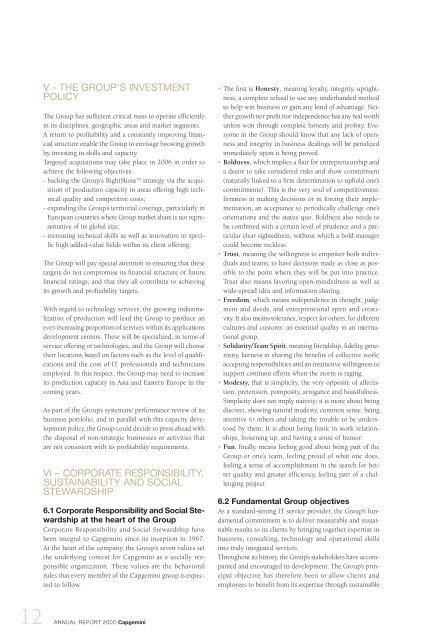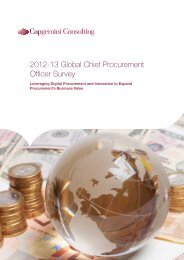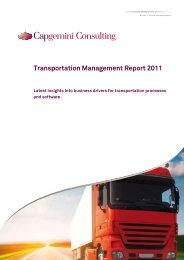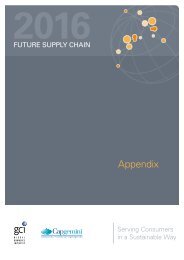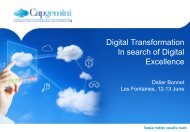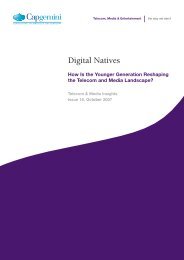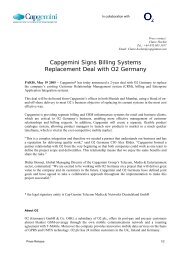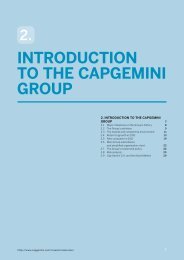You also want an ePaper? Increase the reach of your titles
YUMPU automatically turns print PDFs into web optimized ePapers that Google loves.
12 ANNUAL<br />
V - THE GROUP’S INVESTMENT<br />
POLICY<br />
The Group has sufficient critical mass to operate efficiently<br />
in its disciplines, geographic areas and market segments.<br />
A return to profitability and a constantly improving financial<br />
structure enable the Group to envisage boosting growth<br />
by investing in skills and capacity.<br />
Targeted acquisitions may take place in 2006 in order to<br />
achieve the following objectives:<br />
- backing the Group‘s RightShore TM strategy via the acquisition<br />
of production capacity in areas offering high technical<br />
quality and competitive costs;<br />
- expanding the Group’s territorial coverage, particularly in<br />
European countries where Group market share is not representative<br />
of its global size;<br />
- increasing technical skills as well as innovation in specific<br />
high added-value fields within its client offering.<br />
The Group will pay special attention to ensuring that these<br />
targets do not compromise its financial structure or future<br />
financial ratings, and that they all contribute to achieving<br />
its growth and profitability targets.<br />
With regard to technology services, the growing industrialization<br />
of production will lead the Group to produce an<br />
ever-increasing proportion of services within its applications<br />
development centers. These will be specialized, in terms of<br />
service offering or technologies, and the Group will choose<br />
their locations based on factors such as the level of qualifications<br />
and the cost of IT professionals and technicians<br />
employed. In this respect, the Group may need to increase<br />
its production capacity in Asia and Eastern Europe in the<br />
coming years.<br />
As part of the Group’s systematic performance review of its<br />
business portfolio, and in parallel with this capacity development<br />
policy, the Group could decide to press ahead with<br />
the disposal of non-strategic businesses or activities that<br />
are not consistent with its profitability requirements.<br />
VI – CORPORATE RESPONSIBILITY,<br />
SUSTAINABILITY AND SOCIAL<br />
STEWARDSHIP<br />
6.1 Corporate Responsibility and Social Stewardship<br />
at the heart of the Group<br />
Corporate Responsibility and Social Stewardship have<br />
been integral to <strong>Capgemini</strong> since its inception in 1967.<br />
At the heart of the company, the Group’s seven values set<br />
the underlying context for <strong>Capgemini</strong> as a socially responsible<br />
organization. These values are the behavioral<br />
rules that every member of the <strong>Capgemini</strong> group is expected<br />
to follow.<br />
REPORT <strong>2005</strong> <strong>Capgemini</strong><br />
• The first is Honesty, meaning loyalty, integrity, uprightness,<br />
a complete refusal to use any underhanded method<br />
to help win business or gain any kind of advantage. Neither<br />
growth nor profit nor independence has any real worth<br />
unless won through complete honesty and probity. Everyone<br />
in the Group should know that any lack of openness<br />
and integrity in business dealings will be penalized<br />
immediately upon it being proved.<br />
• Boldness, which implies a flair for entrepreneurship and<br />
a desire to take considered risks and show commitment<br />
(naturally linked to a firm determination to uphold one’s<br />
commitments). This is the very soul of competitiveness:<br />
firmness in making decisions or in forcing their implementation,<br />
an acceptance to periodically challenge one’s<br />
orientations and the status quo. Boldness also needs to<br />
be combined with a certain level of prudence and a particular<br />
clear sightedness, without which a bold manager<br />
could become reckless.<br />
• Trust, meaning the willingness to empower both individuals<br />
and teams; to have decisions made as close as possible<br />
to the point where they will be put into practice.<br />
Trust also means favoring open-mindedness as well as<br />
wide-spread idea and information sharing.<br />
• Freedom, which means independence in thought, judgment<br />
and deeds, and entrepreneurial spirit and creativity.<br />
It also means tolerance, respect for others, for different<br />
cultures and customs: an essential quality in an international<br />
group.<br />
• Solidarity/Team Spirit, meaning friendship, fidelity, generosity,<br />
fairness in sharing the benefits of collective work;<br />
accepting responsibilities and an instinctive willingness to<br />
support common efforts when the storm is raging.<br />
• Modesty, that is simplicity, the very opposite of affectation,<br />
pretension, pomposity, arrogance and boastfulness.<br />
Simplicity does not imply naivety; it is more about being<br />
discreet, showing natural modesty, common sense, being<br />
attentive to others and taking the trouble to be understood<br />
by them. It is about being frank in work relationships,<br />
loosening up, and having a sense of humor.<br />
• Fun, finally, means feeling good about being part of the<br />
Group or one’s team, feeling proud of what one does,<br />
feeling a sense of accomplishment in the search for better<br />
quality and greater efficiency, feeling part of a challenging<br />
project.<br />
6.2 Fundamental Group objectives<br />
As a standard-setting IT service provider, the Group’s fundamental<br />
commitment is to deliver measurable and sustainable<br />
results to its clients by bringing together expertise in<br />
business, consulting, technology and operational skills<br />
into truly integrated services.<br />
Throughout its history, the Group’s stakeholders have accompanied<br />
and encouraged its development. The Group’s principal<br />
objective has therefore been to allow clients and<br />
employees to benefit from its expertise through sustainable


